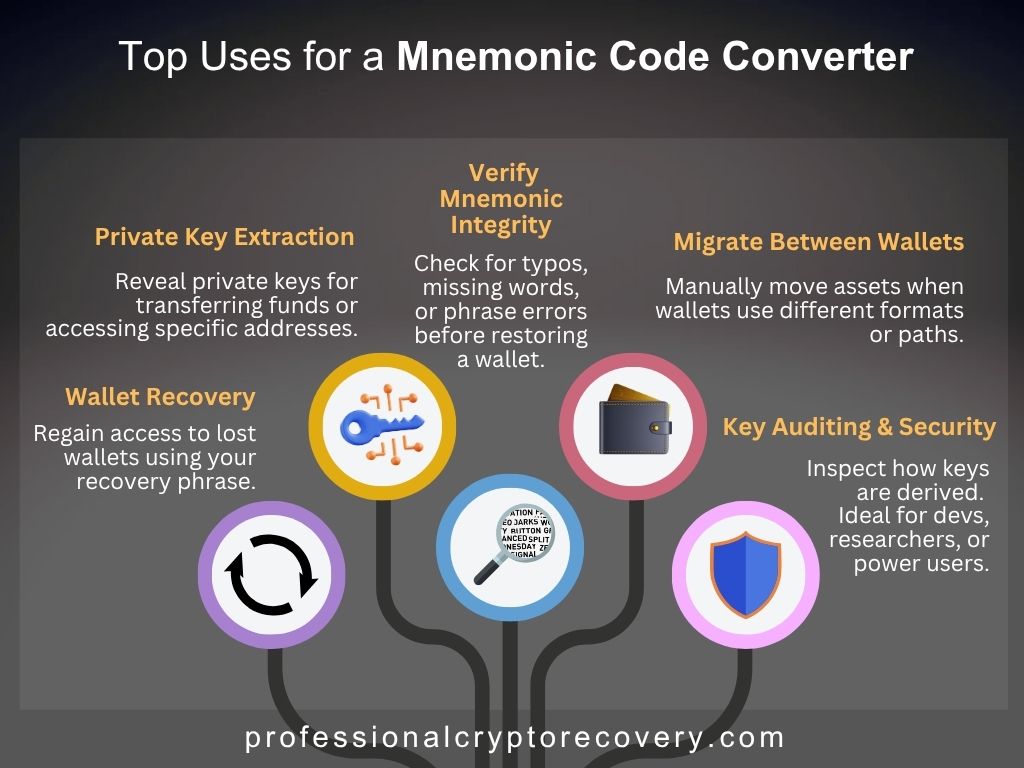A Mnemonic Code Converter (MCC) is a tool that transforms mnemonic phrases into cryptographic keys, allowing you to recover a wallet, extract private keys, and derive addresses for multiple cryptocurrencies.
Your wallet’s mnemonic or recovery phrase is a set of 12-24 randomly generated words that hide your private keys. It plays a crucial role in self-custody by ensuring you can always regain access to your funds even if you lose your original wallet software or hardware.
The recovery phrase is composed of everyday words because that’s what people remember best. But when you feed it into a wallet, it is converted back into raw private keys. Many modern wallets have an internal mnemonic-to-key conversion process so you don’t see this process.
Still, there are tools out there that let you do the conversion yourself. Examples include Ian Coleman’s BIP39 Mnemonic Code Converter, Bitcoin Core’s bitcoin-cli deriveaddresses, and MyEtherWallet’s built in Mnemonic Converter.
These are powerful tools that let you engage in what is essentially a sensitive process. A slight mistake and you risk exposing your private keys to malware, hackers, or scammers. Thus, they should only be used in an air-gapped environment and by experienced experts.
How It Works

Mnemonic Code Converters operate by following a structured process based on the BIP-39 standard, which defines how mnemonic phrases are converted into wallet keys. Here’s what that typically entails:
- Input a Mnemonic Phrase: A user enters a 12, 18, or 24-word mnemonic into the converter. These words come from a fixed 2048-word list used in BIP-39.
- Conversion to Entropy: The mnemonic phrase is converted into a binary entropy value that is validated using a checksum to ensure the mnemonic is correct.
- Generating the Seed: The entropy is fed into another cryptographic function to generate a 512-bit seed that acts as the foundation for deriving private keys.
- Deriving the Master Key (BIP-32): The seed is used to generate a BIP-32 master keypair, consisting of a master private key (xprv) and a master public key (xpub).
- Deriving Addresses Using BIP-32, BIP-44, BIP-49, BIP-84, and BIP-141: Different wallets use different derivation paths to generate specific addresses. Example derivation paths are:
- m/44’/0’/0’/0/0 → Bitcoin (Legacy)
- m/49’/0’/0’/0/0 → Bitcoin (SegWit)
- m/84’/0’/0’/0/0 → Bitcoin (Native SegWit)
- Retrieving Private Keys and Addresses: The user can then extract private keys for specific addresses. These keys can be imported into a compatible wallet to access funds.
Uses of a Mnemonic Code Converter
Mnemonic Code Converters are essential tools for cryptocurrency wallet recovery, key management, and verification. They provide users with a way to manually extract and verify cryptographic keys derived from mnemonic phrases.

Below are the most common uses.
1. Wallet Recovery
Mnemonic code converters can be used to recover lost or inaccessible wallets. If a wallet application is lost, deleted, or no longer supported, a user can enter their recovery phrase into a converter to derive the seed, private keys, and addresses needed to restore access.
2. Private Key Extraction
Some wallets do not provide direct access to private keys, but a mnemonic code converter can generate them. This is useful for:
- Moving funds to another wallet that requires private key import.
- Accessing individual addresses rather than restoring an entire wallet.
3. Verifying Mnemonic Integrity
A mnemonic code converter allows users to check if a mnemonic phrase is valid before using it. Since BIP-39 mnemonics include a checksum, the tool can confirm whether a phrase has been entered correctly or if any words are missing or out of order. This helps prevent loss of funds due to incorrect backups.
4. Migrating Between Wallets
Users who want to switch wallets but have issues with direct imports can use a mnemonic code converter to extract their private keys or extended keys. This allows them to manually import funds into a new wallet, especially in cases where wallets use different derivation paths.
5. Advanced Security and Key Auditing
For users who want full control over their keys, a mnemonic code converter helps audit derived keys and addresses before using them in a live wallet. This is particularly useful for developers, researchers, and security-conscious users who want to understand how wallets generate keys from mnemonic phrases.
Regardless of your reason for using a mnemonic code converter, you’re advised to do so in a secure, offline environment to prevent exposing your sensitive keys to the internet. You don’t want your assets joining the billions of dollars lost every year to crypto theft. You should also:
- Turn off any browser extensions before using a mnemonic code convertor
- Clear your cache and cookies before going back online
- If possible, only use this tool on a device that will never come back online
Examples of Mnemonic Code Converters
1. Ian Coleman’s BIP-39 Mnemonic Code Converter
This is one of the most widely used mnemonic code converters. It is open source and supports multiple derivation paths, including BIP-44, BIP-49, BIP-84, and BIP 141 making it ideal for recovering wallets and verifying mnemonic integrity.
2. Bitcoin Core’s bitcoin-cli deriveaddresses
Bitcoin Core provides a built-in command-line utility to derive addresses from an extended public or private key. This feature is useful for wallet verification, auditing, and manual key recovery without relying on third-party tools.
Note that Bitcoin Core keeps the entire process within a local Bitcoin node. Users can also generate legacy or SegWit addresses directly from their mnemonic-derived extended keys.
3. MyEtherWallet’s Mnemonic Converter
MyEtherWallet (MEW) provides a built-in mnemonic recovery tool specifically for Ethereum and ERC-20 wallets. It allows users to enter a BIP-39 mnemonic phrase and derive Ethereum addresses.
What Can Go Wrong When Using One and What to Do
Using a mnemonic code converter can be unsuccessful for various reasons.
Such as:
- Entering an incorrect mnemonic
- Using the wrong derivation path
- Corrupt or partial mnemonics
With the first two issues, you only need to double-check your mnemonic or make sure you’re using the correct derivation path. But with a corrupt or partial mnemonic, a crypto recovery professional is better suited to reconstruct the missing data.
Professional Crypto Recovery has been in the recovery business for 5+ years. Leaning on our wealth of expertise in IT and data recovery, we can help you recover a corrupt or partial seed phrase at some of the best rates in the market.
Contact us now to get started.
FAQs
What Is a Mnemonic Code Converter?
A Mnemonic Code Converter is a tool that transforms BIP-39 mnemonic phrases into cryptographic keys, such as private keys and wallet addresses. It allows users to recover wallets, verify mnemonic integrity, and extract keys for multiple cryptocurrencies.
How Do You Get a Private Key From a Mnemonic?
To derive a private key from a mnemonic phrase, input your 12, 18, or 24-word mnemonic into a Mnemonic Code Converter. The tool will generate a BIP-39 seed, which is used to create a BIP-32 master private key that you can then import into a compatible wallet.
What Is a 12-Word Mnemonic Key?
A 12-word mnemonic key is a human-readable backup phrase that represents a wallet’s private keys. It is a key part of the BIP-39 standard, used to back up and regenerate wallet keys.
The words are selected from a fixed 2048-word list, ensuring security and ease of recovery.
